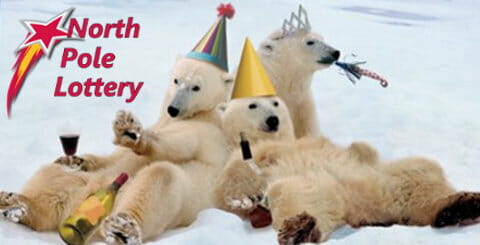
It’s a sociable place the North Pole, although it’s hard to get groups to mix sometimes. Those arctic foxes can be a little snooty and don’t like hanging out with the polar bears. You know how it is. But that doesn’t stop them all partying up there – it helps keep the chills at bay.
Anyway, being a sociable kind of a guy/bear, Chief Polar Bear has proposed we get a group of friends together to try and crack that lottery jackpot (you’re with us, right?). His plan is to join up with 49 of us and form the world’s first North Pole Lottery Syndicate. Each player covers the cost of 1 North Pole lottery ticket (each with different numbers of course) and all the tickets are pooled together.
Here Is Quiz Question No.2
What are the odds of the North Pole Lottery Syndicate hitting the jackpot?
(Hint: don’t forget this is a 6 balls from 49 game)
Answer The Question Here (& Maybe Win A Prize)
There are 3 ways (you only need to use 1):-
1. Add your answer to this post on Facebook OR
2. Reply to this Tweet on Twitter OR
3. Add a comment on this Google+ Post
I’m looking forward to seeing your answers again to this one as there were loads of great answers to Question 1.
Look out for my answer here in a couple of days, when I’ll also be putting Question 3 to you.
What About Question 1 & Those Prizes?
If you missed the first question, do not despair. You can still answer Question 1 here, where you can also find details about the prizes too.
Stay warm everyone.
Your Answers
Wow, we had some very varied answers for this one. There is however only one 100% correct answer to this (but everyone who had a go is still eligible for the prizes).
The important thing to remember when working out your odds/chances is that you simply multiply.
That’s why playing in a syndicate can be such a powerful way to improve your chances. Typically it costs you the same or only a little bit more, but you get 50 times the chances of winning. There is a downside in that you have to share of course. But as any syndicate winner will tell you – would you rather have a part-share of the jackpot, or all of nothing..?
[You can read more about playing in lottery syndicates here, which includes links to the ones I use online]
It’s a common mistake to take the 50 away from the total combinations. That’s the wrong approach. So the answer is NOT 13,983,816 minus 50 = 1 in 13,983,766.
Not sure why?
Think of a dice. If you guess 2 numbers you have 2 chances of being right. But there are still 6 possible results – they didn’t go anywhere. So your odds are 2-in-6.
The other bit that confuses a lot of people is how you ‘simplify’ that 2-in-6 to be a 1-in-something.
Sorry for the math lesson but I’ll keep it very brief!
All you do is divide both ‘sides’ by the same thing. In this case by 2 (because 2 / 2 = 1, and you want a 1-in-something). So you divide the other side by 2 as well. 6 / 2 = 3. Which gives you 1-in-3.
Or if you want the shortcut, just divide the big number by the number of combinations played. Simple as that 🙂
My Answer
 So let’s apply this to my original question.
So let’s apply this to my original question.
First thing, I did throw a sneaky spanner in your works. And Paul was amongst those who spotted my deliberate attempt to trip you up “What’s in a word 1 x Chief Polar Bear and 49 of us = 50 of us”.
So all of you who worked on 49 members in the group – sorry, but ‘got ya’ 🙂
Which means we are actually buying 50 different combinations.
Now as I mentioned the North Pole Lottery is a 6 balls from 49 game. Which means there are 13,983,816 different possible combinations – just the same as any 6 from 49 game. (We don’t need to do the math for this, I’m just not that mean)
Using our shortcut we simply divide that by 50 to get our answer. 13,983,816 / 50 = 279,676 (to the nearest whole number).
So our chances of winning the jackpot with the North Pole Syndicate are 1-in-279,676.
Or as some of you put it “a lot better”.
Congrats to Joe, Col, Eileen, Sandra, Peter, Stewart, Paul and Stephen who got the exact answer. Although many more of you were either very close (tripped up by my Chief Bear + 49) or on the right lines.
Congrats also to Art for being posted to Churchill, Manitoba in the 70’s – the polar bear capital of the world 🙂 . Where locals leave their cars unlocked just in case anyone needs a quick escape from a marauding bear (they can be mean when they’re hungry, just ask the Chief! Or Art.).
The comments are now open below if you want to discuss further.

Comments and discussion now welcome – be it polar bears, syndicates or tricky math.
That’s great to know honestly. Now I can apply that information to smaller number lotteries. The only problem I see is what if you get an exact 5 number duplicate ticket while playing your QP combinations? I mean as an individual I buy 100 quick pick tickets and one of them is an exact 5 number duplicate? I still only have 99 tickets instead of 100.
Hi Kwan
Quick picks are not so bad though, despite what certain people say. And the chances of getting a duplicate line are pretty remote.
But if you’re buying 100 tickets you would be better off wheeling (aka ‘a system entry’) – that way you can choose an appropriate win guarantee for the game. It’s not a big deal, but it is better than not wheeling, and all these small changes add up (this is the kind of thing we cover in my Strategy Group, which explains the ins and outs of wheeling and includes some software for it too).
Funnily enough, I think Question 3 might just be about this very topic…
OK. Yes i agree that if I’m going to spend that much money i would be better off using a system which btw I looked into Prof William Fosters system as one of the ones you recommended and I do find it useful. But no matter what you do as noted, luck will always have the last say. Multiple systems that cover all the numbers despite only playing a certain amount. Say a 5/39 game. You play 20 of those in a wheel, if one of the 19 remaining comes up in the draw, then you know you have no shot at the jackpot because you didn’t cover all the numbers. I like the idea of that but still where the numbers come out is the issue.
Yes, absolutely. Luck will always be the final factor – nothing we can do about that. The best you can do is help luck as far as you can by using good strategy, then simply enjoy playing. Because if you enjoy playing then it’s good value for money even when you don’t win.
Hi, Um! 276,676 to 1, lets put it into perspective, at those odds it still a bad bet, if you don’t have a functional plan that works. I.E. a university did a study on lotteries, through their Science Dept. Their findings were as they expected, lotteries are random. However, during their studies on number frequency, their computer threw up some interesting results, which they did not expect and could not properly explain. (no, nothing mechanical, but something else).
It’s a lot better than 13 million to 1 though wouldn’t you agree? 🙂 Playing the lottery is not an investment, never will be. Luck will always play the major part in winning, but you can play more wisely than most by applying good Strategy.
At which Univerity was this study? Was it research by students or a Professor (science dept, not the math dept)?
Hi, I posted, what I thought would be interesting about a university study on Lotteries. You can do what you will with this information, I personally found it interesting, so don’t shoot the messenger. It was FYI only. I made no claims that is was valid or relevant. Just that I have never heard of their study before. Is that clearer (LG). I personally have been studying lottery for over 30 years, and many claims made by people, about lotteries, are bogus. We share info, that’s how we learn.
It is interesting, but you didn’t give us any details to be able to find the study? 🙂
All I need are his winning lucky numbers.
If only it were that simply 😉
Hi, I have read your review on different lottery systems and you say most systems out there are junk. Which is most probably true. So, my question is, if you don’t believe in lotto history, filtering and most strategies put forward, what do you believe is a “good strategy”. You have never put forward your strategy for lotto, only what you believe does not work. So! what works for you? I’m very curious. Regards Ray
I’m glad we agree 🙂
I don’t entirely disbelieve in using histories to look for trends (see my answer to Q1). But it should be way down the list of priorities, yet it’s the first thing most players look for (‘miracle prediction software’). You’ve seen some of my strategy though here on the blog and from my lottery tips emails that you’ve read. It starts with choosing the right game to play in the first place.
You said to divide the 13 million plus odds by 50 to get new odds. If there are over 13 million COMBINATIONS and you are only playing 50 COMBINATIONS, wouldn’t you just subtract 50 from the 13 million?
No. :-).
But it is a common mistake to do it that way – here’s why you don’t.
To see that subtracting doesn’t work, you can calculate the odds for buying all but 1 combination. If you subtract you get 13,983,766 – 13,983,765 = 1, which would be 1-in-1 chance (or 100%, a guaranteed win). But that can’t be right because you haven’t bought 1 of the combinations.
Similarly if you buy all the combinations, by subtracting you get 13,983,766 – 13,983,766 = 0. And a 1-in-0 chance doesn’t make sense.
Hope that’s clearer 🙂